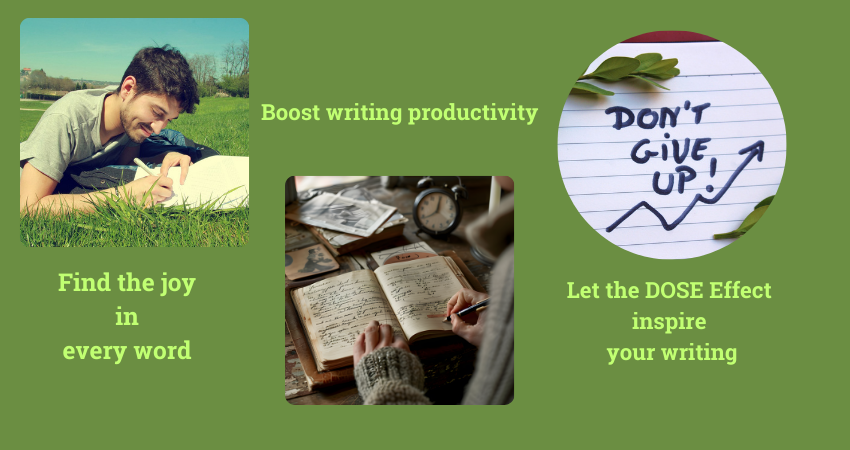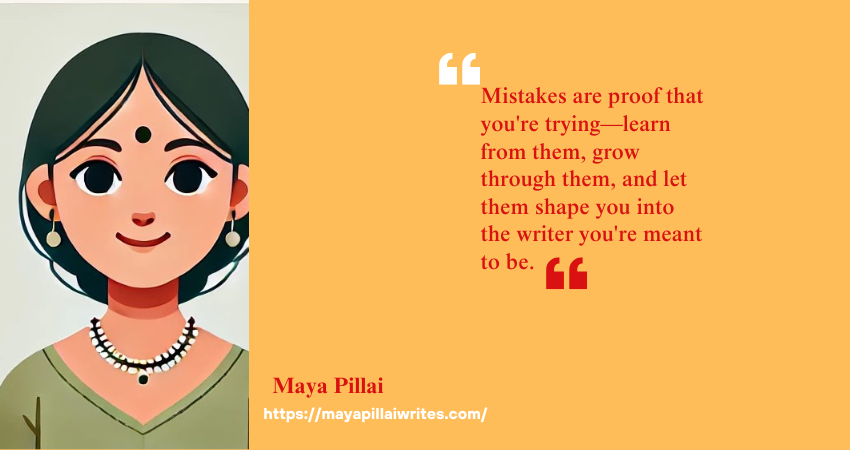How I Trained Myself to Write Daily (and Actually Enjoy It)

You’ll notice the title sounds quite impressive (at least, I hope it does!). But the great thing is that anyone can achieve this — and it’s not as daunting as it sounds. All these outcomes came from doing small, consistent actions every day over a long period. Cultivating a writing habit does not need perfect conditions. Actually, it begins with a tiny action of writing every day. Whatever I have achieved today is the outcome of the small but smart and regular actions that I have taken over a long period of time. I strongly believe that tiny habits have a way of evolving into life-changing patterns and writing is no different. Here are the four core principles I used to build lasting habits. Every time I wanted to improve, these four approaches worked without fail. Let’s go straight into the topic. 1. Start Small: Write for Just a Few Minutes a Day When I first focused on building my writing habits, the biggest mistake I made was to ask myself too much. I aimed too high out of excitement – I went from barely journaling once a month to setting goals like “ writing a full short story every week.” The gap between where I was and where I wanted to be was too wide. And I failed after a week. And each failure made it harder to even try the next day. As James Clear explains in Atomic Habits, habits are fundamentally about routines. He further goes on to explain that routines thrive when you focus on small wins and visible progress. And these routines build habits. The breakthrough came when I discovered the idea of starting tiny. Instead of expecting a polished blog post daily, I committed to writing just one small sentence a day. Quality over Quantity. Even one rough sentence counted as a win. This tiny commitment removed excuses. Once writing one sentence became second nature, I naturally started writing two…then a paragraph…then a page. Over time, these small, manageable actions built momentum without feeling overwhelming. Example: My Journey Daily Writing Habit: One sentence every evening before bed. Result: In the first year, I wrote three times more articles and finally completed a novella draft. Bonus: Writing became a stress-free, joyful part of my daily routine — not a chore. 2. Focus on One Habit at a Time One of the biggest challenges in habit-building is trying to change everything all at once. I wanted to improve my writing skills, exercise daily, meditate, and cook homemade meals; and all in the same month! Naturally, I failed at all of them. Here’s what I decided to do: I started focusing on one key habit; writing daily. Until that habit felt automatic — something I no longer had to push myself into — I didn’t add anything else. This made building the habit easier and the success, sustainable. When you give your full attention to just one habit, it grows stronger, faster. 3. Remove Barriers: Make Writing Easy and Accessible We tend to underestimate how small friction points can derail habits. Even something as simple as not knowing what to write about can become a roadblock. I made it easier by: Keeping a journal and pen on my bedside table Keeping a book with writing prompts bookmarked Pre-deciding when and where I would write (e.g., “After dinner, at my desk”) By eliminating decisions and setup effort, writing became almost automatic. If you reduce the number of choices and hurdles, showing up becomes the default. Tip: Create a writing space that feels welcoming. It doesn’t have to be fancy. Even a cleared-off corner with a cup of tea can signal “It’s time to write.” 4. Celebrate Small Wins Initially, finishing a paragraph felt underwhelming — “Is this even progress?” I thought. But learning to celebrate small victories made all the difference. Each finished page, each day I kept the streak alive, each story idea scribbled down; these were all wins worth noticing. Celebrating tiny milestones fuels your motivation. It builds confidence and reinforces the identity of “I’m someone who writes daily.” A small ritual, like ticking a calendar or giving yourself 5 minutes of guilt-free Instagram scrolling after writing, can anchor your brain to that success. To Sum UP The real secret to building a writing habit? Small steps, taken daily, with patience and celebration. If you show up consistently, even in the tiniest way, the results compound beautifully. By the end of the year, you won’t just be someone who “wants to write more” —you’ll be a writer.
Holding On vs. Letting Go: The Silent Struggle We All Face

Letting go isn’t just about giving things away—it’s about releasing the weight we place on them.
When my yoga instructor tells me to let go after a posture, I do it effortlessly. But when my mother suggests giving away books I no longer read, I hesitate. Why is it so easy to release tension in my body but so hard to release the past?
The DOSE Effect: Boost Writing Productivity with Science-Backed Habits

Boost writing productivity with the DOSE Effect, a science-backed strategy that uses Dopamine, Oxytocin, Serotonin, and Endorphins to transform your writing habits into a fulfilling and rewarding experience.
Timeless Writing Advice from C.S. Lewis That Still Inspires Today

Great writing isn’t just about stringing words together—it’s about clarity, rhythm, and authenticity. Decades ago, C.S. Lewis shared simple yet profound advice that still resonates today. From silencing distractions to writing with passion and precision, his words serve as a timeless guide for anyone looking to sharpen their craft. Whether you’re drafting your next LinkedIn post or penning your first book, Lewis’s wisdom reminds us that writing well is an art—and it all starts with the fundamentals.
How Perfectionism in Writing Holds You Back and What to Do About It

Perfectionism in writing can feel like a heavy-weight. On the surface, it might seem like a positive trait—a sign of dedication to your craft. But in reality, it can hold you back. The pursuit of flawless work often leads to endless revisions, self-doubt, and even procrastination. Here’s the truth: no piece of writing will ever be perfect, and that’s okay. Embracing imperfection is what helps you grow as a writer and, ultimately, create your best work. The Struggle with Perfectionism Perfectionism can sneak into your writing life in subtle ways. Maybe you hesitate to start a project because you feel unprepared. Or you might spend hours rewriting a single paragraph, chasing some unattainable ideal. Perfectionism convinces you that your worth as a writer is tied to how flawless your work appears—and that’s simply not true. This mindset creates a vicious cycle. You avoid taking risks for fear of failure, which means you never fully explore your creative potential. It’s like being stuck in a loop of “not good enough,” and it robs you of the joy that comes with simply putting your thoughts into words. How Perfectionism Hinders Progress Procrastination: The fear of falling short of unrealistic expectations can prevent writers from even starting a project. This “paralysis by analysis” keeps ideas trapped in the mind instead of making their way to the page. Overediting: Perfectionists often fall into the trap of endlessly tweaking sentences and paragraphs. What begins as a draft becomes a never-ending cycle of revisions, turning progress into stagnation. Self-Doubt: The constant pursuit of flawlessness amplifies insecurities, making writers question their talent or ability to create something meaningful. Burnout: Striving for perfection drains emotional and mental energy, leaving writers exhausted and uninspired. Over time, this can lead to the dreaded “writer’s block,” where the pressure to perform stifles creativity entirely. 6 Ways to Break Free from Perfectionism The good news is you don’t have to stay stuck. There are practical ways to loosen perfectionism’s grip and rediscover the freedom of writing. Here are some strategies that can help: Focus on Progress, Not Perfection Celebrate small wins. Did you write a paragraph today? Great! Every word you put on the page is progress, and progress is what leads to finished work. See Mistakes as Part of the Process Mistakes aren’t failures; they’re opportunities to learn. Each “flawed” draft is a stepping stone toward something better. Give yourself permission to create messy first drafts. Set Realistic Expectations Forget the idea of perfection. Aim to write something honest, engaging, or thought-provoking. These qualities matter far more to readers than perfection. Adopt a Growth Mindset Writing is a skill you develop over time. Your ability to improve depends on practice, not perfection. The more you write, the better you’ll get. Be Kind to Yourself Treat yourself the way you would a friend. Would you criticize a fellow writer for struggling with a draft? Of course not. Offer yourself the same compassion. Set Deadlines and Move On Deadlines can be your best friend. They force you to finish and let go of a project, even if it feels incomplete. Trust that “good enough” is often exactly what’s needed. Why Imperfection Makes Better Writers Let’s be clear: embracing imperfection doesn’t mean settling for mediocrity. It means giving yourself the freedom to take risks, make mistakes, and grow from them. Some of the most powerful writing comes from moments of vulnerability and authenticity—qualities that can’t shine through if you’re paralyzed by perfectionism. Think of your favorite books. Chances are, they weren’t born perfect. They were revised, reshaped, and polished over time. What makes them resonate is not their perfection, but the humanity in their pages. The same can be true for your work. To Wrap Up Perfectionism in writing might feel like an obstacle, but it doesn’t have to stop you. By focusing on progress and letting go of the need to be flawless, you can reclaim the joy of writing. Every writer—from beginners to seasoned pros—faces moments of doubt. What sets successful writers apart is their ability to keep going. So, give yourself permission to write boldly, make mistakes, and learn along the way. The world doesn’t need perfect writers; it needs real, authentic voices. And yours is one worth sharing. Are you looking for a writer who can transform ideas into impactful content that resonates with your audience? Let’s collaborate to craft authentic stories that drive results. Contact me today to take your content to the next level!
10 Mistakes Freelance Writers Make

Let’s be honest—freelance writing can feel like a juggling act. Between finding clients, meeting deadlines, and producing top-notch work, it’s easy to slip up. Whether it’s undervaluing your time or rushing through edits, every writer makes mistakes. But here’s the thing: those mistakes aren’t career-ending. They’re opportunities to learn and grow. If you’ve ever felt stuck or frustrated in your freelance writing journey, you’re not alone. Let’s unpack 10 common mistakes freelance writers make and how you can avoid them. 1. Saying Yes to Every Project Freelance writers often feel pressured to say “yes” to every opportunity, especially when starting out. But taking on every project can leave you overwhelmed, overworked, and, frankly, uninspired. Not every job will align with your skills or interests, and that’s okay. The solution? Take a step back and evaluate each opportunity. Does the project excite you? Does it pay fairly? If not, it’s better to politely decline than to burn out on work that doesn’t fulfill you. 2. Undercharging for Your Work Many freelance writers struggle with pricing their services. It’s tempting to lowball your rates to land a client, but that often backfires. Charging too little not only undervalues your expertise but can also leave you stressed about making ends meet. Instead, research what other writers in your niche charge and confidently set rates that reflect your skills. Remember, your time and talent are worth it. 3. Miscommunicating with Clients Clear communication is the backbone of any successful project. Without it, misunderstandings can crop up, leaving both you and your client frustrated. It’s easy to assume you know what the client wants, but assumptions often lead to mistakes. Always ask questions, clarify details, and provide updates throughout the project. Clients appreciate writers who take the time to get things right. 4. Missing Deadlines We’ve all been there—biting off more than we can chew and scrambling to finish on time. Missing deadlines, though, can harm your reputation and damage client trust. To avoid this, get real about how long a project will take. Use tools like Google Calendar to keep track of deadlines and break the work into manageable chunks. And if life throws you a curveball? Communicate with your client right away. They’ll value your honesty. 5. Skipping the Editing Phase You’ve just finished a draft, and the temptation to hit “send” is strong. But skipping the editing phase is one of the biggest mistakes a freelance writer can make. Even small typos can leave a bad impression. Make editing non-negotiable. Take a short break before revisiting your draft with fresh eyes, and use tools like Grammarly or Hemingway to catch errors. The extra effort goes a long way. 6. Avoiding Self-Promotion If promoting yourself feels awkward, you’re not alone. Many writers hesitate to market their skills, relying instead on job boards or word-of-mouth. But avoiding self-promotion limits your growth. A strong online presence—like a polished LinkedIn profile or a personal website—can showcase your expertise and attract the right clients. You don’t need to brag; just share your work and let it speak for itself. 7. Forgetting to Use Contracts Skipping contracts might save time upfront, but it can lead to headaches later. Without clear terms, you risk payment issues, scope creep, or even losing control of your work. Protect yourself and your clients by always using a simple contract. It doesn’t need to be fancy—just outline what you’re delivering, when, and for how much. 8. Trying to Be a Jack-of-All-Trades Many freelance writers try to cover every topic under the sun, thinking it will make them more marketable. But being a generalist often makes it harder to stand out. Clients look for specialists who understand their industry. Find a niche you’re passionate about—whether it’s tech, travel, or parenting content—and focus on building your expertise there. You’ll not only attract better-paying clients but also enjoy the work more. 9. Taking Feedback Personally Let’s face it—receiving feedback can sting. Writing is personal, and criticism can feel like a direct attack on your skills. But taking feedback personally only holds you back. Instead, view it as an opportunity to improve. Ask yourself, “What can I learn from this?” Applying constructive feedback helps you grow and build stronger client relationships. 10. Neglecting Professional Growth Freelance writing isn’t a “set it and forget it” career. Trends evolve, and clients expect writers to keep up. If you’re not actively improving your skills, you risk falling behind. Dedicate time to learning, whether it’s through online courses, books, or webinars. Staying curious and adaptable ensures you stay competitive in the industry. To Wrap Up Mistakes are a natural part of any journey, and freelance writing is no exception. What matters most is how you respond to them. By recognizing these common pitfalls and taking proactive steps to avoid them, you’ll set yourself up for long-term success. Remember, it’s okay to make mistakes—they’re opportunities to learn, grow, and become an even better writer. So, which mistake will you tackle first? Looking for a writer who can bring your brand’s voice to life? I’d love to help. Let’s talk about your project and create content that works as hard as you do!
Tips to Write a Short Story in 1500 Words

Writing a short story in 1500 words is a challenge that tests your creativity and precision. The beauty of short fiction lies in its brevity—it captures a moment, an emotion, or a transformation in just a few pages. It’s like crafting a snapshot of life that resonates deeply, all while staying concise. But here’s the tricky part: how do you deliver an unforgettable story within such a tight limit? If you’ve ever felt stuck while trying to fit an entire world into a handful of paragraphs, you’re not alone. Many writers struggle with balancing detail and brevity, but with the right approach, you can create a masterpiece that stays with your readers long after the last word. This blogpost will walk you through actionable tips to write a compelling short story in 1500 words or less—without sacrificing creativity or impact. 1. Anchor Your Story with a Strong, Singular Concept Every great story starts with a compelling idea. The key to writing a short story is to keep your focus razor-sharp—there’s no room for sprawling plots or endless backstories. Zero in on One Theme or Event: Ask yourself, “What’s the essence of this story?” Whether it’s a moment of redemption, a life-changing decision, or an unexpected encounter, choose one central idea and build around it. Example: Instead of writing about a character’s entire journey, focus on the moment they decide to leave their small town or confront an old friend. Relatable Meets Unique: The best stories feel universal yet fresh. Tap into emotions your readers can connect with—love, loss, fear—but frame them in an unexpected way. Example: A story about unspoken love might center on a woman writing a letter she never intends to send. Your concept is the heart of the story. Once you have it, everything else will naturally fall into place. 2. Let Your Characters Speak Volumes with Fewer Words In a short story, your characters need to feel real and memorable—quickly. With limited space, every detail about them has to pull its weight. Focus on One or Two Key Characters: You don’t need an ensemble cast. A protagonist and maybe one supporting character are enough to drive your narrative. Show, Don’t Tell: Instead of saying, “John was shy,” let his actions reveal his personality. Maybe he hesitates before knocking on a door or avoids eye contact during a tense conversation.Details That Define: Use a single vivid detail to make a character come alive. A worn leather jacket, a nervous tick, or a tendency to hum under their breath can make them unforgettable. 3. Start in the Middle of the Action Readers don’t have time to wade through paragraphs of setup in a short story. Grab their attention from the very first line. In Media Res: This Latin phrase means “in the middle of things.” Drop your readers right into the story’s most interesting moment. Example: Instead of, “It was a rainy day, and Jane was feeling restless,” try, “The knife clattered to the floor as Jane slammed the door shut, her breath ragged.” Hook Them with the First Line: Your opening sentence is your chance to intrigue, shock, or delight your reader. A question, an action, or a bold statement works wonders. Example: “They always said the house was haunted, but no one told me it would laugh.” 4. Structure Your Plot for Maximum Impact Even in a short story, you need a clear beginning, middle, and end. But brevity means cutting straight to the core. Classic Story Arc: Stick to this framework: Setup: Introduce your protagonist and their world. Conflict: Present the problem or decision they must face. Climax: Deliver the emotional or narrative peak. Resolution: Wrap up the story with a sense of closure—or leave the reader wondering. Trim the Fat: Every scene should serve a purpose. If a paragraph doesn’t reveal something important about the character, setting, or plot, cut it. 5. Use Descriptive Language to Create Atmosphere Good descriptions don’t just paint a picture—they evoke emotion. In a short story, they also save space by doing double duty. Show More, Tell Less: Instead of saying, “The room was cold,” describe the frost on the windows or the character’s breath turning to mist. Lean on the Senses: What does the character see, hear, smell, or feel? Sensory details create vivid, immersive scenes. Example: “The coffee shop smelled of burnt toast and cinnamon, a strange comfort on a winter morning.” Be Concise but Evocative: Descriptive language should enrich the story, not weigh it down. A single metaphor can convey an entire mood. 6. Make Dialogue Work Harder Dialogue is a powerful tool in short stories, but it has to earn its place. Every word should reveal something important. Keep It Realistic: Your characters should sound like real people, but without the “um” and “uh” filler of actual conversations. Advance the Plot: Don’t let dialogue meander. Each line should add depth to the character, hint at backstory, or escalate tension. Example: Instead of “Hi, how are you?” try “I thought you’d never come back.” Use Subtext: Let your characters say one thing but mean another. It adds complexity and intrigue. Example: “It’s fine,” she said, her hand gripping the table edge until her knuckles turned white. 7. End with a Bang (or a Whisper) The ending is where your short story leaves its lasting mark. Aim for something memorable. Resolution Doesn’t Mean Closure: Your story can wrap up without answering every question. Sometimes, ambiguity keeps readers thinking. Example: “He watched her walk away, the letter still crumpled in his pocket.” Deliver an Emotional Punch: Whether it’s joy, sorrow, or surprise, the ending should resonate deeply. Consider a Twist or Revelation: A well-executed twist can elevate your story, but it should feel earned—not gimmicky. 8. Edit Like Your Story Depends on It (Because It Does) Once you’ve written your story, the real work begins: Cut Ruthlessly: Every sentence, word, and comma must serve a purpose. Tighten your prose until it feels lean and impactful. Read Aloud:
9 Unique Traits of Writers Who Communicate Better in Writing

Writers who communicate better in writing than speaking often find a unique power in the written word, allowing them to express their thoughts and emotions in a way that spoken language sometimes cannot capture. As a passionate writer, I’ve often wondered why some of us find solace and strength in the written word while grappling with the spontaneity of verbal communication. This exploration has revealed nine unique traits that define those who express themselves more effectively through writing than speaking. Each trait not only highlights a different facet of our writing journey but also invites reflection on our creative processes. If you’ve ever felt more at home with a pen in hand, read on to discover what makes your writing voice truly unique. You might find yourself nodding along, realizing that these traits have shaped your own writing style and personal brand. 9 Unique Traits of People Who Express Themselves Better Through writing Deep Observers I tend to notice the subtleties in the world around me—nuances of conversation, body language, and emotions that others might overlook. This attentiveness allows me to capture the essence of a moment in writing, creating vivid imagery and relatable narratives. For instance, a simple coffee shop encounter can transform into a beautifully crafted story that resonates with my readers. Thoughtful Reflectors Before I commit my thoughts to paper, I often spend time reflecting. This trait ensures that my ideas are fully formed and my arguments are compelling. While speaking can lead to spontaneous responses, writing gives me the space to ponder, revise, and refine, turning initial thoughts into polished gems. Intuitive Empathizers My ability to empathize with others enhances my writing. Understanding different perspectives allows me to craft stories and messages that resonate with a diverse audience. It’s this emotional connection that draws readers in, making them feel seen and understood through my words. Wordsmiths at Heart I find joy in the craft of writing—choosing just the right words to evoke emotion or paint a picture. This love for language transforms my thoughts into impactful prose, making the written word my preferred form of expression. Whether it’s a blog post or a personal essay, I relish the opportunity to shape my narrative with care and creativity. Creative Thinkers Imagination fuels my writing. I thrive on weaving together ideas, concepts, and narratives that might seem unrelated at first glance. This creativity empowers me to present information in fresh, intriguing ways that spark interest, transforming even the most mundane topics into compelling reads. Patient Listeners I value listening—whether to others or to my inner voice. By absorbing different viewpoints and experiences, I can enrich my writing with a variety of influences and insights. This trait also allows me to connect with my readers on a deeper level, showing that I understand their needs and concerns. Curious Explorers Curiosity drives me to explore new topics and ideas. This trait not only broadens my knowledge but also enriches my writing, enabling me to connect with readers on various subjects and keep them engaged. Every piece I write is an opportunity to learn something new, whether about the world or about myself. Detail-Oriented Perfectionists My attention to detail ensures that my writing is polished and precise. I relish the editing process, refining my work until it truly reflects my voice and intent—something that can be challenging in the heat of conversation. This dedication to quality fosters a sense of trust with my readers, who can rely on my work for clarity and insight. Fearless Truth-Tellers Writing gives me the freedom to express my truths without the immediate pressures of a verbal exchange. I can delve into difficult subjects and share my authentic voice, knowing that my words can have a lasting impact. This courage is what sets my writing apart, allowing me to tackle topics that matter to me and resonate with others. To Wrap Up As I reflect on these traits, I realize that they not only shape my writing journey but also connect me with fellow writers and readers. If you see yourself in any of these descriptions, embrace them! Writing is a powerful tool for self-expression and personal branding. By honing these qualities, I continue to grow as a writer, finding my unique voice and carving my niche in the literary world. What about you? Which traits resonate with your own writing style? Share your thoughts in the comments below! And if you found this post inspiring, consider sharing it with your writing community or subscribing for more insights on honing your craft.
